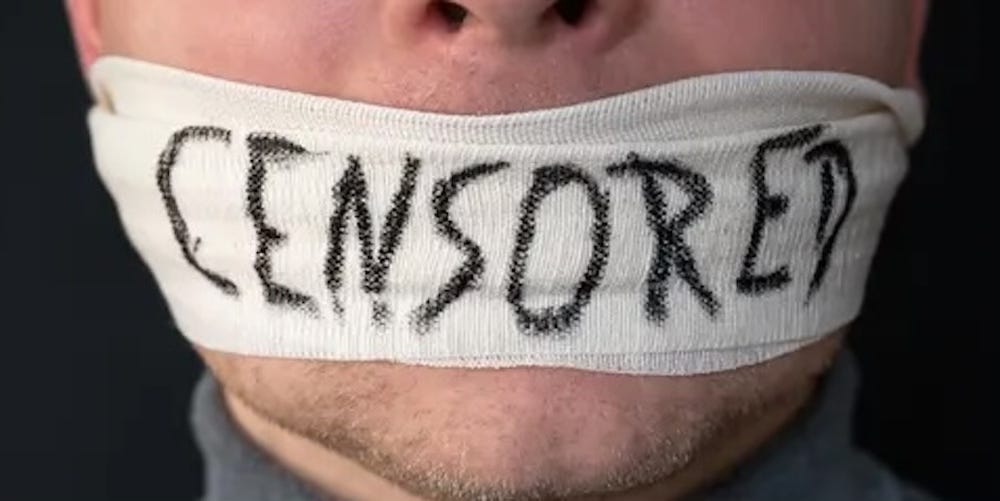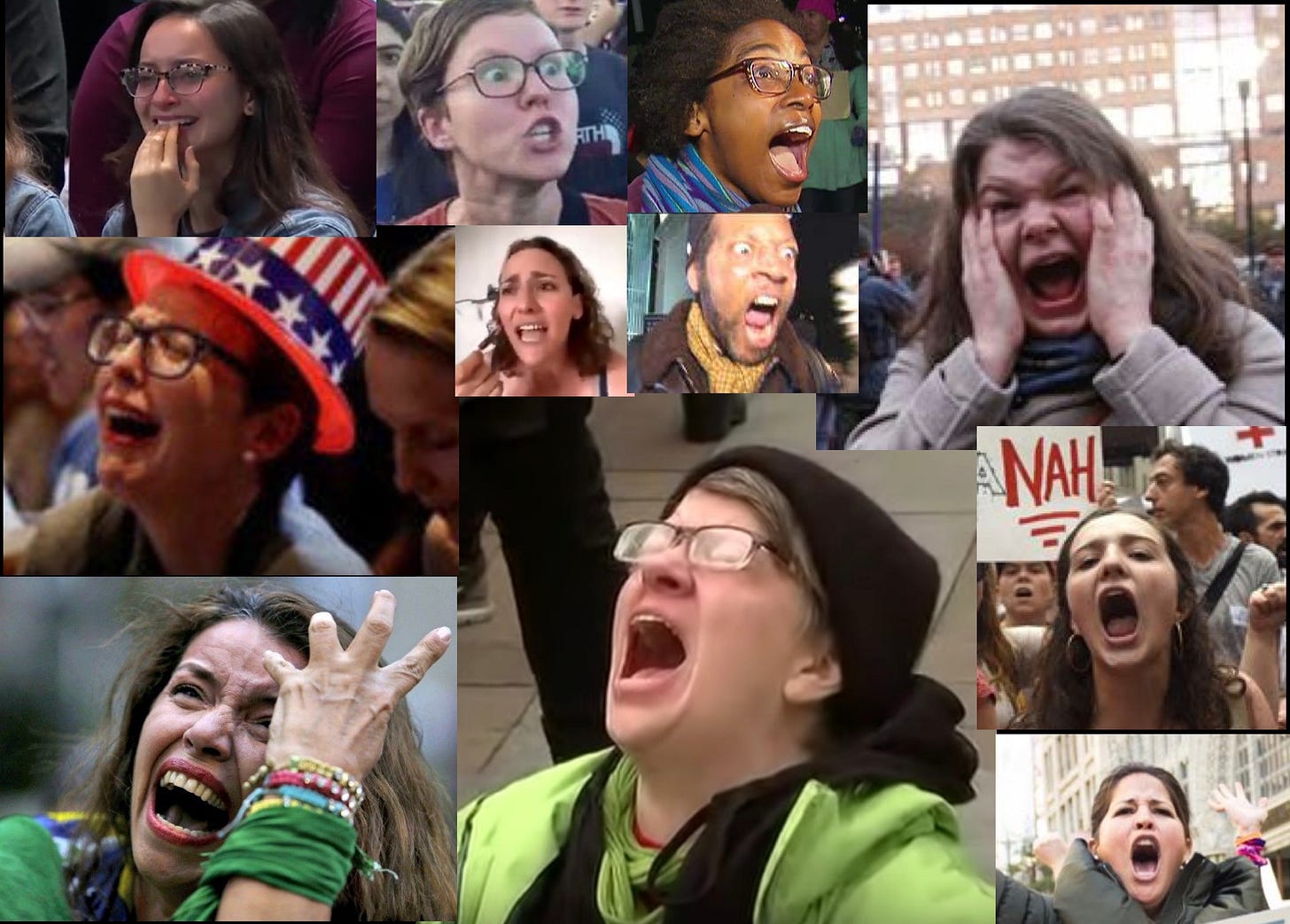About That First Amendment
In 2018, Chelsea Russell, a nineteen year old British woman, was distraught over the death of a friend. Her sadness prompted her to post lyrics from Snap Dogg's "I'm Trippin'" to her Instagram account, presumably as a memorial or tribute.
Since the lyrics she posted included the N word (it repeats ten times in the song), she was charged with a hate crime, sentenced to 500 hours community service, fined the equivalent of $700, and had to abide by an 8 PM to 8 AM curfew for eight weeks.
Per one source, in 2017, nine people per day were being arrested in the UK for speech violations, with more than half of them actually getting convicted of a crime. Konstantin Kisin, in this video from 2019, noted that in the same year that the UK arrested 3300 people for speech crimes, Russia arrested 400.
There was recently a firestorm over comments by Justice Ketanji Brown Jackson's comments during the oral arguments for Murthy v Missouri, a case about government looking to exert influence over private social media companies. While, as is so often the case, a proper look at context undermines the outrage the comments generated (see: Donald J. Trump and "bloodbath"), both this and the Russell matter highlight how vital it is that America has an explicit and absolute First Amendment, and how troubling it is that a large and possibly growing swathe of Americans reject it.
A decent number of years ago, I had a conversation with an (older, white, male) acquaintance who I feel safe describing as a mainstream, party-line Democrat. In that conversation, the topic of hate speech came up, and as we discussed that matter, his preference that the N word be banned. Presumably with penalties such as those imposed on Ms. Russell.
In that, he appears to be of the same mind as about 40% of college students.
"Hate speech" is, problematically, a subjective thing. It either requires reading someone's mind as to intent or relying on a third party's interpretation of the words spoken. If that third party is of a mind that any utterance of certain words, intent or context notwithstanding, that third party now has censorious power over others. If that third party is of a mind that black rappers can say the N word but white fans of black rappers cannot repeat lyrics, verbally or in print, that third party breaks the core principle of equal treatment under the law.
If a society doesn't defend free speech to the fullest extent possible under the presumption of equal rights for all, that society will eventually see speech controlled by exactly the people that the First Amendment prohibits from infringing on free speech. The limits to free speech are clear, specific, and built upon the foundational notion that my rights cannot override yours. Those limits are slander, libel, perjury, intimidation, and incitement, and that’s it. The last includes the "fighting words" concept. None of those limits apply to what Ms. Russell did.
Unfortunately, the UK does not have a First Amendment. 1A and the rest of the Bill of Rights were born of a violent divorce from the UK (more accurately, Great Britain). Some of the Founding Fathers had trepidations about an explicit Bill of Rights, believing that, since the Constitution did not authorize the government to infringe on speech et al, it could not, and fearing that enumerating some rights would make it easier to infringe on others.
I'm glad they didn't get their way. Our government and its enablers amongst the voters have proven they don't care about the principles of limited government, and even plain language in the Constitution that says "thou shalt not infringe" hasn't stopped them from all sorts of shenanigans that include a (garbage) argument that ‘since 1A isn’t absolute, we can put whatever restrictions we want on it.’ They never actually say that, because they are cheats and liars, but that’s the truth behind their word salad.
If you're sympathetic to the concept of criminalizing “hate speech,” consider, as I've warned, time and again, that any rule you you might wish imposed to punish free behaviors you don't like will (yes, will) eventually be used to punish behavior you do like, or even punish you yourself.
Accepting infringements of free speech, no matter how noble of purpose they appear, is an invitation to disaster in the long run. Give the government a tool and it'll misuse it at some point. It'll also fight, tooth and nail, to resist your taking that tool away when it does misuse it. As do, again, the government's enablers and lickspittles. Liberty is hard won, easily lost, and hard to recover once ceded.
If the Court, in ruling on Murthy v Missouri, debars the government from bullying social media companies (I offer a previous piece, Soft Coercion, which points out that government coercion doesn’t have to be explicit to work) into acting censoriously against its preferred targets, be prepared for much gnashing of teeth. Similarly, if the Court overturns the Chevron Deference in ruling on Loper Bright v. Raimondo and Relentless v. Department of Commerce, watch the Big Government apologists whine and wail and sky-scream.
Indeed, some are already doing so in the latter case, preemptively declaring that such ruling will:
allow individual judges to implement their partisan policy preferences instead of abiding by agency expertise;
impede the federal government’s ability to effectively serve the American people;
allow the federal judiciary to amass unchecked levels of power.
Did you hear my eyes roll? I heard some of yours, and that's before I hit the ‘publish’ button.
We will hear all about how the Court just rubber-stamped the spreading of misinformation and disinformation by anyone, anywhere, and any time.
We won't hear that they believe only the government should be allowed to spread misinformation and disinformation. Because, for our own good. Even as it finds ways to punish us for speech that is neither.
A footnote: After I put this article to bed, serendipity rewarded me with this headline:
JK Rowling dares cops to arrest her for misgendering trans people after new woke hate crime law
Scotland just enacted a new hate crime law, that “bans hatred on the basis of age, disability, race, religion, sexual orientation and transgender identity.” Whether misgendering or deadnaming (using someone’s pre-transition name e.g. Bruce rather than Caitlyn Jenner) is going to be prosecuted remains to be seen, but I’d love to see the authorities try to have at Rowling. I default to being initially respectful of another’s wishes, so I’m not among those who would reject someone’s new name, but there’s courtesy and there’s coercion, and by now you should know my views on the latter. Time for politicians, there and everywhere, to stand up for freedom rather than totalitarian censorship.
And a follow-up. The government blinked.




First, IMO, there's no such thing as "hate speech" - there's just speech. Hate is something that exists within a person, and while they may use their free speech to express that hate, it's still just speech.
"allow individual judges to implement their partisan policy preferences instead of abiding by agency expertise"
Let me provide a wonderful example of agency "expertise", courtesy of the ATF: https://www.youtube.com/watch?v=vsUMM0Da4UI
It's only a few minutes long, and worth watching. The narrator doesn't even hit on some of the other issues that he could have been addressed, such as one of the ATF agent's statements that, "Congress determined back in the 1930s that short-barreled rifles which were both smaller than a certain length and...were designed to be fired from the shoulders...that combination made it unusually dangerous." That is not true in the least. As the ATF's own website admits, "the NFA was enacted by Congress as an exercise of its authority to tax" (https://www.atf.gov/rules-and-regulations/national-firearms-act). Of course, in order to further justify it (and their own existence), they state that, "the NFA had an underlying purpose unrelated to revenue collection...its underlying purpose was to curtail, if not prohibit, transactions in NFA firearms. Congress found these firearms to pose a significant crime problem because of their frequent use in crime." It wasn't that they were "unusually dangerous;" it's that they were used, a LOT. The NFA also didn't outlaw any firearms; it just made them more cost-prohibitive to obtain. Of course, in 1934, when the NFA was enacted, who could afford to pay $200 in addition to the sale price of a gun? I mean, we're talking about the great depression era - the Social Security Act wasn't even passed until the following year. Only the criminals could afford that tax stamp. So, it goes back to the original purpose - revenue, which can be understood from the fact that the NFA has never been amended to change that tax stamp; it's still $200 to this day, and to this day, the firearms are no more difficult to obtain than filling out the appropriate (unconstitutional) paperwork and paying the $200 fine for wanting to exercise your right that is supposed to be, by the Second Amendment, protected from government infringement.
My point in all that is to agree - if allowed, government will do whatever it wants, despite the Constitution; and once they are able, they will *not* easily give that power back (the ATF has been getting smacked down in court quite a bit lately, and they're not happy, as you could tell by the agent's whining in the video).
Brilliant as always, Peter! 😁👍 Thanks for itemizing the five exceptions to free speech. Since you mentioned libel, it makes me wonder about sedition - is the latter subsumed under incitement?